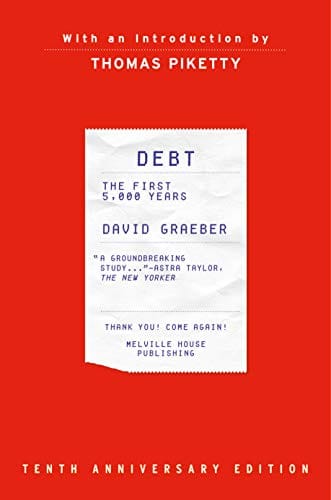
'Debt: The First 5,000 Years' by David Graeber
Buy on:
Amazon Bookshop.orgSome links displayed may be affiliate links on which Kevin earns a commission. To read more about the affiliate links we're using, visit our affiliates page
Why I'm Reading It
The history of money and finance and capitalism is more interesting to me as I get older (and have a little money). My knowledge base is small, but it's growing. I liked the idea of getting an anthropologists take instead of a historians.
My Thoughts, Critique, Review
I took so many notes on my Kindle for this one. So much history. A dismantling of the myth of money's invention might have been my favorite specific section. The overall takeaway was, to me, that so many of our economic ideas (whether capitalistic or communalistic) are inherently about power, war, and collective belief. I'm not sure it's a surprising takeaway, but the presentation is eloquent, unique, and thought provoking.
Publisher's Description
The groundbreaking international best-seller that turns everything you think about money, debt, and society on its head—from the “brilliant, deeply original political thinker” David Graeber (Rebecca Solnit, author of Men Explain Things to Me)
Before there was money, there was debt. For more than 5,000 years, since the beginnings of the first agrarian empires, humans have used elaborate credit systems to buy and sell goods—that is, long before the invention of coins or cash. It is in this era that we also first encounter a society divided into debtors and creditors—which lives on in full force to this day.
So says anthropologist David Graeber in a stunning reversal of conventional wisdom. He shows that arguments about debt and debt forgiveness have been at the center of political debates from Renaissance Italy to Imperial China, as well as sparking innumerable insurrections. He also brilliantly demonstrates that the language of the ancient works of law and religion (words like “guilt,” “sin,” and “redemption”) derive in large part from ancient debates about debt, and shape even our most basic ideas of right and wrong.
We are still fighting these battles today.